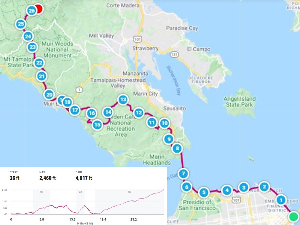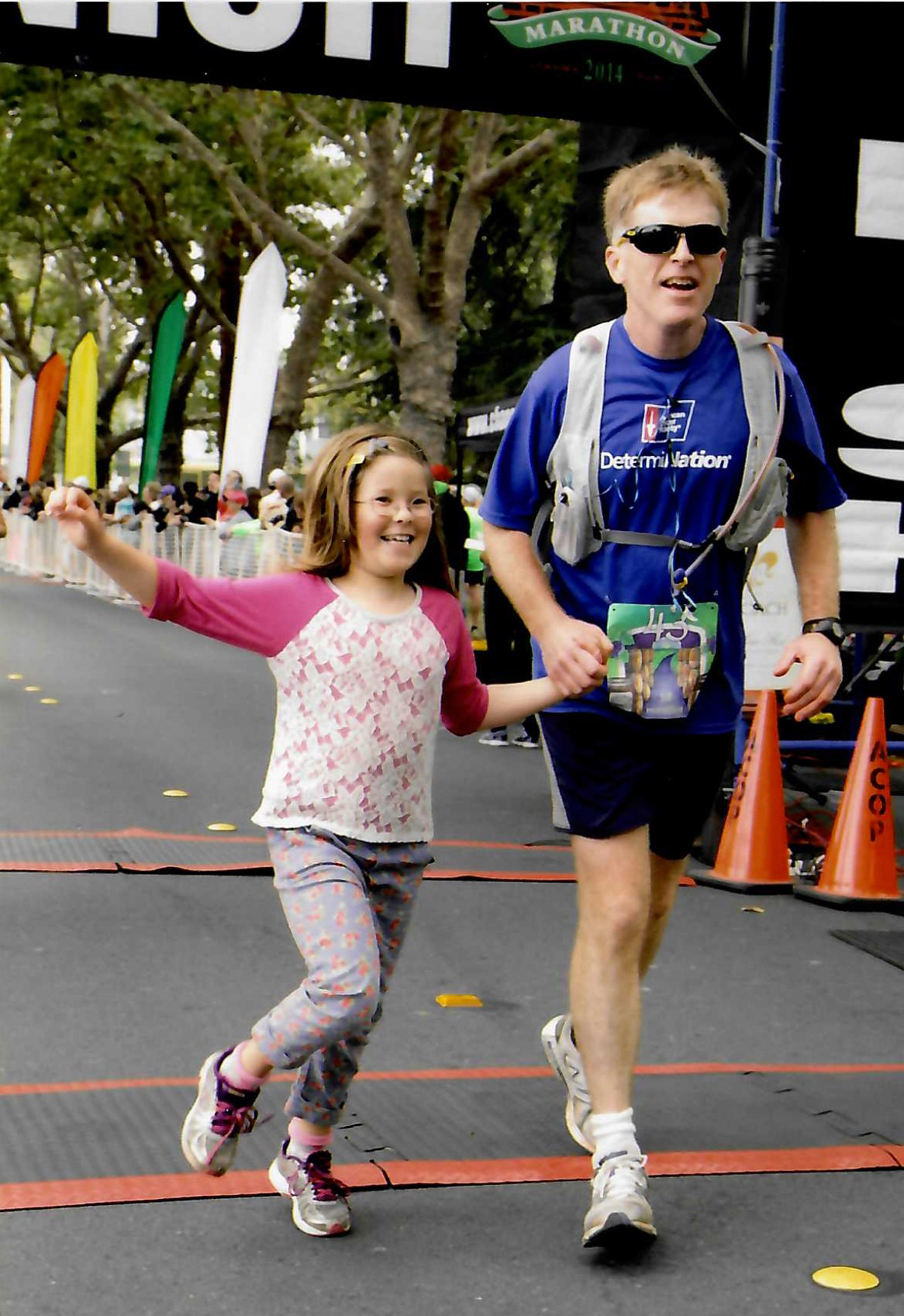
Dr. Alain Algazi trains with HDFCCC employee Bella Nadler and her husband Kevin.
On October 4th, Alain Algazi, MD, a melanoma specialist and head-and-neck cancer researcher at UCSF, will join friends and colleagues in running a marathon across SF and Marin to benefit the American Cancer Society. The ambitious 26.5 mile course will begin at the Hi Dive Bar under the Bay Bridge and will end at the top of Mount Tamalpais.
Below, Dr. Algazi explains how this crazy marathon came to be, how the UCSF community can follow along, and why the American Cancer Society is so deserving of our support.
Q&A with Alain Algazi, MD
What initially drew you to sign up for the 2020 Virgin Money London Marathon benefitting the American Cancer Society?
I wanted to run all six marathon majors. I had already ran Boston, New York, Chicago, and Berlin, and I had an entry for Tokyo. I saw that I could run London as a fundraiser for the ACS and that looked like a perfect fit, since I believe so strongly in what they do.
Due to the pandemic, the 2020 London Marathon transitioned to a mostly virtual event. Can you describe the new course that you’ll run? How did you come up with this route?
I was looking for a route that was truly absurd to make it feel like a real event. Many marathoners are looking for a race that is flat and fast so that they can set a new personal record (PR). The course that I made up is entirely PR-proof. We start at the Hi Dive Bar under the Bay Bridge at 6 am on 10/4 (approx. tea time GMT) with some alcohol-optional mimosas, then we run the Embarcadero and across the Golden Gate Bridge. After that, it’s all trail across the mountains to Muir Beach. By the time we get to the finish on the top of Mt. Tam, it’s at least a marathon--more if we get lost--and about a mile of straight-up elevation gain. The course is carefully calibrated to be out of cell phone reception for the last 18 miles or so, so calling a Lyft will be out of the question.
 "I was looking for a route that was truly absurd to make it feel like a real event. Many marathoners are looking for a race that is flat and fast so they can set a new personal record (PR). The course that I made up is entirely PR-proof."
"I was looking for a route that was truly absurd to make it feel like a real event. Many marathoners are looking for a race that is flat and fast so they can set a new personal record (PR). The course that I made up is entirely PR-proof."Who will be joining you in this adventure?
Bella Nadler, the lead protocol editor at the Cancer Center and her husband Kevin, an impressive long distance swimmer who plans to do the run “off the couch,” will be running along with my regular running buddy, Wayne. Matt, a super nice guy and an accomplished ultra-runner from the San Francisco Road Runners Club, has also agreed to join. My wife, UCSF Pediatric Anesthesiologist Gail Shibata, and perhaps some others will be providing support at three aid stations.
Have you run other marathons before? How long have you been running in general?
I started running about 10 years ago and I have run 20 organized marathons in the past 8 years or so. Running 18-22 miles on a Saturday is my idea of a good time. I also run to and from work on a regular basis. Beats sitting in a car.
How do you handle training when the air quality is poor?
That’s kind of a new thing in the past week. So far, I set up an air filter next to my Stairmaster at home, but, I’ve got to say, it’s much more fun to spend 3-4 hours on a long run than it is to spend 90 min on the Stairmaster. Besides that, I plan to re-time my next long run for when the air is better.
How long have you been on the faculty at UCSF? What were you doing before you came here?
I came to UCSF as a heme/onc fellow in 2007. Before that, I was a medical student and an internal medicine resident at UCLA. I spent about 10 years working before I went to medical school. I like to say that I started taking pre-med classes in 1995 after Jerry Garcia died, but that was really just a coincidence.
What led you to pursue melanoma and head-and-neck cancer research?
Since I decided to go to medical school, I also wanted to work in rational therapeutics, the idea that we can learn some truth about a disease and then apply it to make better treatments for cancer. There were great opportunities in melanoma when I started, including a great mentor at UCSF, Adil Daud, and pending therapeutic revolutions with BRAF-targeted agents and immune checkpoint inhibitors. Along the way, I had always seen head and neck cancer patients because there was no formal medical oncology program in the field at UCSF. When Eric Small asked me to lead a new program in head and neck medical oncology, I realized that there was a huge unmet need and it sounded like a great opportunity to make a big difference!
 Dr. Algazi supports the ACS in the 2014 Santa Rosa Marathon with his daughter, Claire.
Dr. Algazi supports the ACS in the 2014 Santa Rosa Marathon with his daughter, Claire.In your fundraising statement, you mentioned that you were an American Cancer Society Fellow early on in your career. In what other ways has the ACS supported your research, your program, and/or your patients?
The American Cancer Society regularly provides support for my patients who need help with transportation and lodging. Much of the subspecialty care in the US is concentrated at tertiary care centers in major cities, and patients with complex medical problems in rural areas have to travel to get access to clinical trials and other cutting edge care. The price of a hotel room in San Francisco for one night might be the same as somebody’s monthly food budget. The ACS bridges the gap to make it possible for many of my patient to get care at UCSF.
In terms of my research, the ACS Fellowship was really the springboard for my career that helped me to get established at UCSF and to launch a career as an independent clinical investigator. Since then, I’ve been able to bring in plenty of funding for my work, my staff, and for my no-longer-nascent Head and Neck Medical Oncology Program.
How can the UCSF community support your efforts and follow your progress during the race?
Anyone who’d like to join me in supporting the ACS can visit my fundraising page.
Follow me on Strava and I will follow you back; it will be fun! I will post the run once we are done and I will send a few photos by email to all supporters. This will, by necessity, be a very small and socially distanced event, but your support and positive thoughts are very much appreciated!
Is there anything else you would like to add?
Drink carrot juice. It’s the secret sauce of my running career. That, and eat toast. Lots of toast. Carrot juice and toast may not actually help you run, but I think that arbitrary recommendations are truly in the spirit of this event.